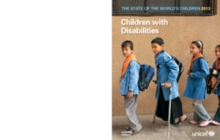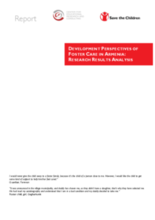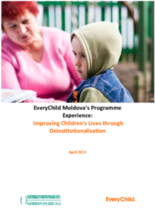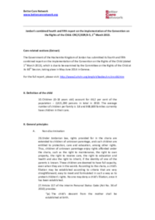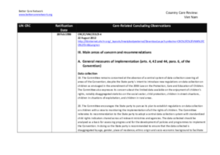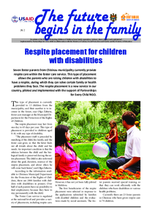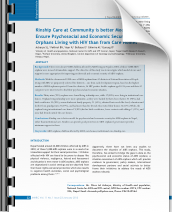Displaying 481 - 490 of 691
In its 2013 State of the World’s Children Report, UNICEF has chosen to highlight the particular issues, needs, and circumstances of children with disabilities worldwide. The report includes a description of the common issues that children with disabilities face, models for inclusive policy and practice, and an agenda for action moving forward.
This report produced by the Center for Educational Research and Save the Children summarises a broader research study which examined the foster care pilot programme introduced in Armenia in 2005. The study aimed to find out if the pilot program succeeded, what problems arose, how the program could be improved and how foster care in Armenia could develop and expand effectively.
This issue No. 3-4 is one in a newsletter series concerning care reform in Moldova. The magazine was produced by Partnerships for Every Child (P4EC), an NGO in Moldova, with funding from the project, “Protecting children in Moldova from family separation, violence, abuse, neglect and exploitation.”
This Program Review documents the evolution of EveryChild/Partnerships for Every Child’s Program in Moldova since 1994, presenting the development of interventions to improve the lives of children through deinstitutionalization and identifying the best practices and lessons that may be relevant, useful, and replicable to other initiatives and organizations around the world.
This article presents the findings of an exploratory survey of community perceptions about foster care conducted in Udaipur City, Rajasthan, India, in order to assess the prospects for implementing foster care as an alternative to the dominant system of institutional care available to orphaned and abandoned children in India.
The Government of the Hashemite Kingdom of Jordan has submitted its fourth and fifth combined report on the implementation of the Convention on the Rights of the Child (dated 1st March 2013).
This country care review includes the Concluding Observations for the Committee on the Rights of the Child adopted as part of its examination of Vietnam’s combined third and fourth periodic reports at the 60th Session of the Committee held between 9 May and 15 June 2012. The Committee’s recommendations on the issue of Family Environment and Alternative Care as well as other care relevant issues are highlighted.
This Recommendation by the European Commission on Investing in Children, stresses the importance of early intervention and preventative approaches, and makes quality childcare one of its key policy areas to break the cycle of disadvantage in early years and reduce the risk of child poverty and social exclusion.
This 10-page newsletter, translated into English, is issue number two of a series produced by the “Protecting children of Moldova from family separation, violence, abuse, neglect and exploitation” project, which is implemented by Partnerships for Every Child, the Ministry of Labour, Social Protection and Family of Moldova, and the Ministry of Education of Moldova.
The objective of this study was to investigate which model of care and support is more appropriate for improving psychosocial and economic security of AIDS orphans in Nepal.

